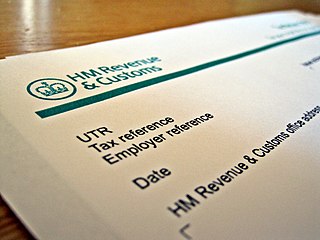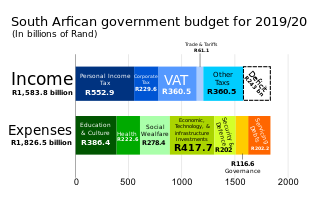A pay-as-you-earn tax (PAYE), or pay-as-you-go (PAYG) in Australia, is a withholding of taxes on income payments to employees. Amounts withheld are treated as advance payments of income tax due. They are refundable to the extent they exceed tax as determined on tax returns. PAYE may include withholding the employee portion of insurance contributions or similar social benefit taxes. In most countries, they are determined by employers but subject to government review. PAYE is deducted from each paycheck by the employer and must be remitted promptly to the government. Most countries refer to income tax withholding by other terms, including pay-as-you-go tax.

Corporation tax in the United Kingdom is a corporate tax levied in on the profits made by UK-resident companies and on the profits of entities registered overseas with permanent establishments in the UK.

HM Revenue and Customs is a non-ministerial department of the UK Government responsible for the collection of taxes, the payment of some forms of state support, the administration of other regulatory regimes including the national minimum wage and the issuance of national insurance numbers. HMRC was formed by the merger of the Inland Revenue and HM Customs and Excise, which took effect on 18 April 2005. The department's logo is the St Edward's Crown enclosed within a circle.

Taxation in the United Kingdom may involve payments to at least three different levels of government: central government, devolved governments and local government. Central government revenues come primarily from income tax, National Insurance contributions, value added tax, corporation tax and fuel duty. Local government revenues come primarily from grants from central government funds, business rates in England, Council Tax and increasingly from fees and charges such as those for on-street parking. In the fiscal year 2014–15, total government revenue was forecast to be £648 billion, or 37.7 per cent of GDP, with net taxes and National Insurance contributions standing at £606 billion.
A corporate tax, also called corporation tax or company tax, is a type of direct tax levied on the income or capital of corporations and other similar legal entities. The tax is usually imposed at the national level, but it may also be imposed at state or local levels in some countries. Corporate taxes may be referred to as income tax or capital tax, depending on the nature of the tax.

In the United Kingdom, a tax return is a document that must be filed with HM Revenue & Customs declaring liability for taxation. Different bodies must file different returns with respect to various forms of taxation. The main returns currently in use are:
A self-invested personal pension (SIPP) is the name given to the type of UK government-approved personal pension scheme which allows individuals to make their own investment decisions from the full range of investments approved by HM Revenue and Customs (HMRC).
IR35 is the United Kingdom's anti-avoidance tax legislation, the intermediaries legislation contained in Chapter 8 of Income Tax Act 2003. The legislation is designed to tax 'disguised' employment at a rate similar to employment. In this context, "disguised employees" means workers who receive payments from a client via an intermediary, i.e. their own limited company, and whose relationship with their client is such that had they been paid directly they would be employees of the client.
A child trust fund (CTF) is a long-term savings or investment account for children in the United Kingdom. New accounts can no longer be created as of 2011, but existing accounts can receive new money: the accounts were replaced by Junior ISAs.
Tax deduction at source (TDS) in India is a means of collecting tax on income, dividends, or asset sales by requiring the payer to deduct tax due before paying the balance to the payee.
An umbrella company is a company that employs agency contractors who work on temporary contract assignments, usually through a recruitment agency in the United Kingdom. Recruitment agencies prefer to issue contracts to a limited company as the agency liability would be reduced. It issues invoices to the recruitment agency and, when payment of the invoice is made, will typically pay the contractor through PAYE with the added benefit of offsetting some of the income through claiming expenses such as travel, meals, and accommodation.
In the United Kingdom, the advance corporation tax (ACT) was part of a partial dividend imputation system introduced in 1973 under which companies were required to withhold tax on dividends before they were distributed to shareholders. The scheme was similar to the way banks were required to withhold an amount at a set rate on interest earned on bank deposits before it is paid to the account holder.
The Share Incentive Plan (SIP) was first introduced in the UK in 2000. SIP's are an HMRC approved, tax efficient all employee plan, which provides companies with the flexibility to tailor the plan to meet their business needs. SIPs are becoming increasingly popular with companies that want to engage their workforce and recruit and retain key employees. From 6 April 2014, HMRC approval will no longer be required for a SIP to obtain tax benefits. Instead, an employer is required to self-certify that the SIP meets the requirements of the relevant legislation. Accordingly, from 6 April 2014, a SIP may no longer be referred to as an HMRC approved plan.
Small Self Administered Scheme (SSAS) is a type of UK Occupational Pension Scheme.
Concentrix is an American business services company specializing in customer engagement and business performance. Concentrix was a subsidiary of SYNNEX Corporation since 2006 and went public as an independent company on December 1, 2020. Concentrix is headquartered in Fremont, California.
Cycle to Work scheme is a UK Government tax exemption initiative introduced in the Finance Act 1999 to promote healthier journeys to work and to reduce environmental pollution. It allows employers to loan cycles and cyclists' safety equipment to employees as a tax-free benefit. The exemption was one of a series of measures introduced under the Government's Green Transport Plan. A Cycle to Work scheme does not require the prior approval of HMRC.

Re Paycheck Services 3 Ltd or Revenue and Customs Commissioners v Holland[2010] UKSC 51 is a UK insolvency law and company law case, concerning misfeasance.

Taxation may involve payments to a minimum of two different levels of government: central government through SARS or to local government. Prior to 2001 the South African tax system was "source-based", where in income is taxed in the country where it originates. Since January 2001, the tax system was changed to "residence-based" wherein taxpayers residing in South Africa are taxed on their income irrespective of its source. Non residents are only subject to domestic taxes.
Income drawdown is a method withdrawing benefits from a UK Registered Pension Scheme. In theory, it is available under any money purchase pension scheme. However, it is, in practice, rarely offered by occupational pensions and is therefore generally only available to those who own, or transfer to, a personal pension.

The Apprenticeship Levy is a UK tax on employers which is used to fund apprenticeship training.






